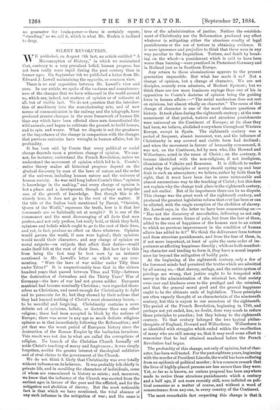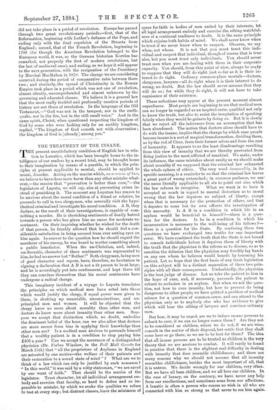SILENT REVOLUTION.
WE published, on August 9th last, an article entitled "A Misconception of History," in which we maintained that, contrary to a very prevalent belief, human progress has not been really more rapid during the past century than in former ages. On September 6th we published a letter from Mr. Edward J. Lowell maintaining the opposite, or common view.
There is no real opposition between Mr. Lowell's view and ours. In our article, we spoke of the vastness and conspicuous- ness of the changes that we have witnessed in the world around us, which are, indeed, not matters of opinion or of estimate at all, but of visible fact. We do not question that the introduc- tion of machinery into the manufacturing arts, and of new means of communication in the railway and the telegraph, have produced greater changes in the mere framework of human life than any which have been effected since men domesticated the wild animals, and began to cultivate the ground, to build houses, and to spin and weave. What we dispute is not the greatness or the importance of the change in comparison with the changes that previous centuries have wrought in human affairs, but its profundity.
It has been said by Comte that every political or social change depends upon a previous change of opinion. We can- not, for instance, understand the French Revolution, unless we understand the movement of opinion which led to it. Comte's entire theory makes all historical progress depend on the &dual discovery by man of the laws of nature and the order of the universe, including human nature and the universe of human society. As was said long before Comte's time," opinion is knowledge in the making," and every change of opinion is but a phase and a development, though perhaps an irregular one, of the growth of knowledge. But though this is ob- viously true, it does not go to the root of the matter. If the title of the Italian book mentioned by Pascal, "Opinion, Queen of the World," expresses the truth, how is it that her commands are so habitually set at nought? It is one of the commonest and the most discouraging of all facts that men profess, and not only profess, but really hold, or think they hold, opinions and beliefs which ought to go to the root of their lives, and yet, in fact, produce no effect on them whatever. Opinion would govern the world, if men were logical ; their opinions would mould their characters, and any change of opinion on moral subjects—on subjects that affect their duties—would make itself felt at the root of their lives. But how far is this from being the fact may be best seen by an instance mentioned in Mr. Lowell's letter on which we are com- menting. "Were the laws of war milder under Tilly than under Titus ?" It is unquestionably true that in the sixteen hundred years that passed between Titus and Tilly—between the destruction of Jerusalem and the Thirty Years' War of Germany—the laws of war had not grown milder. European mankind had become nominally Christian ; men regarded them- selves as Christians, and cared enough for Christianity to fight and to persecute for it ; but they showed by their actions that they had learned nothing of Christ's most elementary lesson,— to be merciful and forgiving. Christianity contains a more definite set of opinions, beliefs, or doctrines than any other religion; these had been accepted in block by the nations of Europe; there was never in any age so much definite religious opinion as in that immediately following the Reformation ; and yet that was the worst period of European history since the destruction of the Roman Empire by the barbarian invasions. This result was not due to what are called the corruptions of religion. No branch of the Christian Church formally set aside Christ's teaching of mercy and forgiveness ; it was simply forgotten, amidst the greater interest of theological subtleties and of rival claims to the government of the Church.
We do not think it likely that Christianity was ever totally
without influence on its believers. It was probably felt chiefly in private life, and in moulding the characters of individuals, some of whom are remembered in history as saints ; and, moreover, we know that the influence of the Church was exerted from the earliest ages in favour of the poor and the afflicted, and for the
mitigation and abolition of slavery. Bat the most noticeable fact is that which we have mentioned, the total absence of any such influence in the mitigation of war ; and the same is
true of the administration of justice. Neither the establish- ment of Christianity nor the Reformation produced any effect whatever in mitigating either the atrocious cruelty of legal punishments or the use of torture in obtaining evidence. It is mere ignorance and prejudice to think that these were in any way peculiar to the Inquisition. Torture, and death by break- ing on the wheel—a punishment which is said to have been worse than burning—were practised in Protestant Germany and in Holland just as in Southern Europe.
Any return to those abominations appears to the present generation impossible. But what has made it so ? Not a change of opinion, but a change of character. We are not disciples, scarcely even admirers, of Herbert Spencer ; but we think there are few more luminous sayings than one of his in opposition to Comte's doctrine of opinion being the guiding force in human affairs :—" The social mechanism does not rest on opinions, but almost wholly on character." The cause of this change of character is one of the most obscure questions of history. It took place during the eighteenth century ; at the com- mencement of that period, torture and atrocious punishments were universal on the Continent of Europe ; at its close they had been, we believe, abolished everywhere throughout Western Europe, except in Spain. The eighteenth century was a period of frequent, almost incessant, war, and the influence of Christianity in any avowed and visible form had declined ; and when the movement in favour of humanity commenced, it was not, on the Continent, led by men who, like Howard and Wilberforce, acted in the name of Christ ; on the contrary, it became identified with the non-religious, if not irreligious, illuminism of Voltaire and Rousseau. It is difficult to under- stand why the principles of mercy should spring up and bear fruit in such an atmosphere ; we believe, rather by faith than by sight, that it must have been due in some untraceable and almost unconscious way to the teaching of Christ ; but this does not explain why the change took place in the eighteenth century, and not earlier. But of its importance there can be no dispute. This change was the great work of the eighteenth century, and produced the greatest legislative reform that ever has been or can be effected, with the single exception of the abolition of slavery. Mr. Lowell says, in the letter we have been commenting on :— " Has not the discovery of ansthetics, delivering us not only from the most severe forms of pain, but from the fear of them, added to the suin of happiness of the human race to an extent to which no previous improvement in the condition of human affairs has added to it P" We think the deliverance from torture and from atrocious punishments, and from the fear of them, is, if not more important, at least of quite the same order of im- portance as affecting happiness directly ; while as both manifest- ing character and tending to form it, they have a moral import- ance far beyond the mitigation of bodily pain.
At the beginning of the eighteenth century, only a few of the foremost minds had perceived the truths which are admitted. by all among us,—that slavery, serfage, and the entire system of privilege are wrong, that justice ought to be tempered with mercy in the administration of the criminal law, that society owes care and kindness even to the prodigal and the criminal, and that the general moral good and the general happiness ought to be the ultimate ends of legislation. These principles are often vaguely thought of as characteristic of the nineteenth century, but this is unjust to our ancestors of the eighteenth. The period of the French Revolution, beginning in 1789, and perhaps not yet ended, has, no doubt, done very much to reduce those principles to practice; but they belong to the eighteenth century. To that century belonged the two typical philan- thropists of England, Howard and Wilberforce. Wilberforce is so identified with struggles which ended within the recollection of many who are still among us, that it may need some effort to remember that he had attained manhood before the French Revolution had begun.
The profundity of this change, not only of opinion, but of char- acter, has been well tested. For the past eighteen years, beginning with the murder of President Lincoln, the world has been suffering from an epidemic of political murder ; it is a nommen remark that the lives of highly-placed persons are lees secure than they were. Yet, so far as is known, no serious proposal has been anywhere made to revive those atrocious punishments which a century and a half ago, if not more recently still, were inflicted on poli- tical assassins as a matter of course, and without a word of remonstrance from anyone, in every country of the Continent.
The most remarkable fact respecting this change is that it tlid not take place in a period of revolution. Europe has passed through two great revolutionary periods,—first, that of the Reformation, beginning with Luther's defiance of the Pope, and ending only with the final expulsion of the Stuarts from England ; second, that of the French Revolution, beginning in 1789 (for though the American Revolution belonged to the European world, it was, as the German historian Kortiim has remarked, not properly the first of modern revolutions, but the last of medimval ones), and ending, as we hope it will appear to the next generation, with the resignation of the Presidency by Marshal MacMahon in 1879. The change we are considering occurred during the period of comparative calm between these two ; and similarly, the spread of Christianity in the Roman Empire took place in a period which was not one of revolution, almost silently, uncomprehended and almost unknown by the governing and educated classes. We believe it is a general law that the most really fruitful and profoundly creative periods of history are not those of revolution. In the language of the Old Testament,—" God was not in the tempest, nor in the earth- quake, nor in the fire, but in the still small voice." And in the same spirit, Christ, when questioned respecting the kingdom of 'God by some who were looking only for an earthly kingdom, replied, "The kingdom of God cometh not with observation ; the kingdom of God is [already] among you."

































 Previous page
Previous page